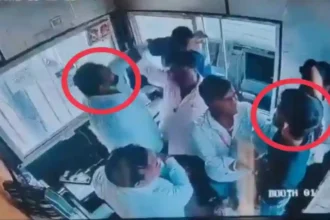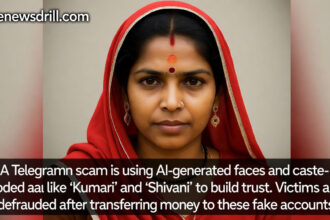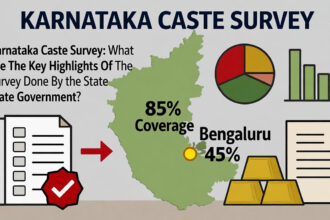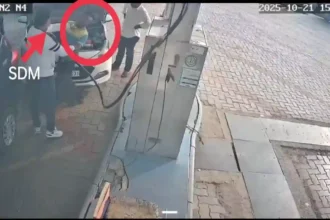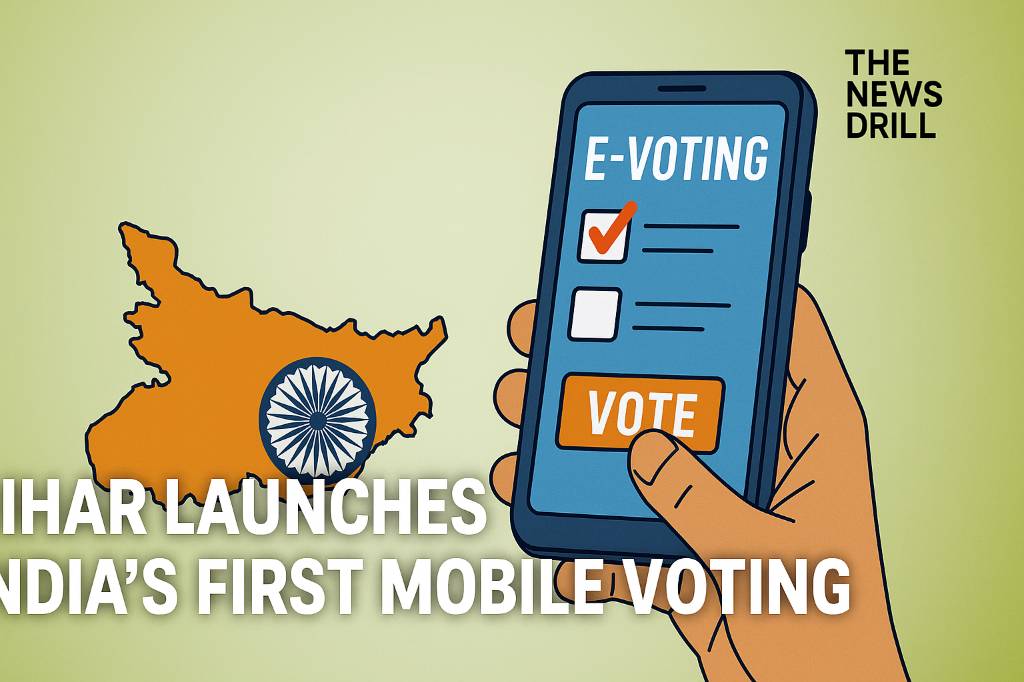
Bihar Makes History: First Indian State to Enable Mobile‑Phone Voting in Urban Elections
In a bold leap toward digital democracy, Bihar has become the first state in India to allow mobile‑phone voting in municipal and local body elections. Held on June 28, 2025, this landmark initiative marks a significant breakthrough in electoral modernization, empowering voters especially seniors, migrants, persons with disabilities, pregnant women, and the infirm with unprecedented convenience and accessibility. The platform was tested across 42 municipalities in 26 districts, recording a voter turnout of nearly 69%.
- Bihar Makes History: First Indian State to Enable Mobile‑Phone Voting in Urban Elections
- Why This Matters
- How It Worked: System and Mechanisms
- The Technology Stack
- Who Could Cast Mobile Votes?
- Registration and Voting Workflow
- Testbed: Buxar By Election and Urban Rollout
- Security & Transparency Measures
- Early Results & Feedback
- Comparing with Global Examples
- The Road Ahead: Scaling & Policy Implications
- Expansion Plans
- Legal & Regulatory Evolution
- Bridging the Digital Divide
- Strengthening Cyber Resilience
- Impacts on Electoral Modernization
- Challenges & Risks of Mobile Voting in Bihar
- 1. Digital Divide
- 2. Cybersecurity Threats
- 3. Voter Identity Verification
- 4. Technical Glitches & App Crashes
- 5. Legal & Constitutional Concerns
- 6. Voter Coercion & Privacy
- 7. System Misuse & Fake Voter Registrations
- 8. Lack of Digital Literacy
- 9. Pilot-Only Limitation
- 10. Public Trust & Transparency
- Lessons Learned From the Pilot
- Voices from the Ground
- Conclusion
Why This Matters
Closing the Participation Gap
Traditionally, obstacles like distance, physical limitations, and migration have disenfranchised many. Bihar’s mobile‑voting system specifically targets:
- Migrants working in other states or abroad (e.g., Dubai, Qatar).
- Persons with disabilities, senior citizens, pregnant women, and the critically ill, who may struggle to reach polling stations.
- First time voters and youth, drawn by the app‑based format.
This inclusive approach aligns with the democratic ideal of universal suffrage and could inspire future electoral expansions beyond urban bodies.
Boosting Voter Turnout
Early results are promising:
- A 69% aggregate turnout a historic high for municipal polls and 70.2% engagement via the e‑voting system.
- In comparison, traditional in person voting hit just 54.6%.
The uptick suggests that digital convenience directly translates to more votes, especially among hard to reach demographics.
How It Worked: System and Mechanisms
The Technology Stack
Bihar deployed a dual‑app system on Android, consisting of:
- e‑Voting SECBHR, developed by C‑DAC, A companion app built by the Bihar State Election Commission.
The system integrates state of the art features:
- Blockchain for tamper evident vote logs
- Face recognition + liveness detection for secure ID verification
- OTP + EPIC number tie‑ins
- Digital receipts akin to VVPATs
- Audit trails for enhanced transparency
This ensures each vote is secure, verifiable, and anonymous.
Who Could Cast Mobile Votes?
Eligible categories included:
- Senior citizens (above 80 years)
- Persons with disabilities
- Pregnant women
- Seriously ill individuals
- Migrants and displaced voters
These groups were prioritized to overcome traditional logistical and health challenges.
Registration and Voting Workflow
- 1. App installation via Google Play or the SEC website.
- 2. Registration using EPIC number, mobile OTP, Aadhaar, and self identified eligibility (e.g., PWBD, senior).
- 3. Biometric authentication: face scan, liveness detection.
- 4. Voting window on June 28, accessible via app or website.
- 5. Confirmation receipt delivered digitally, and votes encrypted until counted on June 30.
Testbed: Buxar By Election and Urban Rollout
Pilot implementation was in Buxar on June 28, targeting 13,000 voters (including seniors, migrants), via the app’s e‑voting window from 7 am to 1 pm vote counting followed on June 30.
It then extended on the same date across six councils in Patna, Rohtas, East Champaran, and others.
Security & Transparency Measures
Robust Identity Verification
- Face recognition + liveness detection guard against impersonation.
- EPIC + Aadhaar confirmations through OTP and face ID ensure voters are legitimate.
- One mobile number → max two users, limiting misuse.
Immutable Vote Records
- Using blockchain, vote records are encrypted and tamper proof.
- A digital VVPAT like receipt provides voters with confirmation of vote entry.
Oversight and Audits
- Votes encrypted at cast time and decrypted officially during counting only.
- Field level engineers and cybersecurity teams conducted first level EVM checks earlier this year; over 176,000 ballot units and nearly 130,000 control units were audited.
- This initiative followed other modernization efforts like the ECINET/VTR app for real time turnout tracking.
- The Election Commission assured “no tampering,” citing advanced cryptographic and audit mechanisms.
Early Results & Feedback
High Engagement
Officially, “70.20 % of eligible voters used mobile voting,” while 54.63 % voted in person. Overall turnout stood at 62.4 %, across 489 booths and 538 candidates.
Landmark Individual Stories
Bibha Kumari of Pakridayal became India’s first voter to cast a ballot via mobile phone. Migrant votes from the Middle East showed international deployment.
Early User Sentiment
Feedback has been largely positive:
A symbol of convenience, security, and empowered participation,” – SEC announcement.
The Federal noted that the system was “easy enough so that even a first time user has no issue voting”.
Areas to Improve
- Cybersecurity concerns: Despite safeguards, critics point to remote voting risks.
- Digital divide may exclude those lacking smartphones or internet access.
- Legal and procedural clarity will be needed before scaling up.
Comparing with Global Examples
Estonia pioneered national Internet voting in 2005, achieving over 40% e‑voting participation.
Bihar becomes the second region globally, after Estonia, to implement blockchain based mobile e‑voting at a large scale.
The Road Ahead: Scaling & Policy Implications
Expansion Plans
While the mobile e‑voting pilot focused on municipal polls, it is being eyed for state assembly elections in late 2025–2026.
Potential to scale up to rural panchayats and more urban bodies after evaluating the pilot.
Legal & Regulatory Evolution
Requires amending the Representation of People Act or internal ECI rules to incorporate e‑voting provisions.
Must define coercion free environments, legal handling of disputes, and post‑count audits.
Bridging the Digital Divide
To avoid excluding those offline, hybrid solutions (like deposit‑and‑vote booths or kiosks) are essential.
Awareness campaigns in Hindi, Urdu and regional dialects, and assistance desks will improve reach.
Strengthening Cyber Resilience
Continuous upgrades to blockchain scaling, cryptographic security, and cyber incident response are crucial.
Independent audits by cybersecurity experts and bipartisan representatives will bolster trust.
Impacts on Electoral Modernization
Digital Empowerment & Civic Inclusion
Bihar’s initiative demonstrates how democracy can be harnessed through technology, providing remote access and empowering marginalized communities.
Efficiency & Resource Optimization
Digital voting reduces the need for polling infrastructure, staff, and logistics while maintaining accuracy through digital audit trails.
Precedent for Other States
If successful, this could catalyze adoption across states and election types (e.g., assembly, Lok Sabha).
Challenges & Risks of Mobile Voting in Bihar
1. Digital Divide
One of the major challenges is the lack of access to smartphones and the internet among rural and economically weaker sections. While mobile voting is aimed at convenience, it may inadvertently exclude those who are already marginalized.
2. Cybersecurity Threats
Implementing a secure mobile voting system requires robust encryption and blockchain protocols. Any vulnerability could lead to data breaches, hacking, or vote manipulation—jeopardizing the integrity of the election.
3. Voter Identity Verification
Ensuring the authenticity of each voter remains a major challenge. Without foolproof biometric or Aadhaar-linked systems, impersonation or fraudulent voting could occur, especially in remote voting.
4. Technical Glitches & App Crashes
App-based platforms can suffer from bugs, server overload, or downtime on election day. These issues could hinder voters from successfully casting their vote, causing frustration and distrust.
5. Legal & Constitutional Concerns
India’s electoral laws are primarily framed around physical voting. The introduction of mobile voting raises questions regarding compliance with the Representation of the People Act and the jurisdiction of the Election Commission.
6. Voter Coercion & Privacy
Unlike a voting booth, a home or open environment may lack the privacy needed for free and fair voting. Voters could be influenced, coerced, or bribed while voting from personal devices.
7. System Misuse & Fake Voter Registrations
There is always a risk of fraudulent registrations, especially if Aadhaar or facial verification systems are compromised or inadequately monitored.
8. Lack of Digital Literacy
Not all eligible voters are comfortable using smartphones or navigating voting apps. Senior citizens and first-time voters may face confusion, leading to voting errors or disenfranchisement.
9. Pilot-Only Limitation
As Bihar’s initiative is currently limited to urban municipal bodies, the effectiveness and scalability to state or general elections remain uncertain.
10. Public Trust & Transparency
People need to trust the new system. Any hint of opacity or manipulation—whether real or perceived—could spark controversy and reduce electoral participation in the long run.
Lessons Learned From the Pilot
- 1. Structured roll out (starting with seniors, migrants, urban councils).
- 2. Two app system aids better verification and flexibility.
- 3. Real‑time election monitoring (ECINET app) complements voter transparency.
- 4. One number two users policy helped prevent mass misuse.
Voices from the Ground
Bibha Kumari: “I never thought I’d vote via my phone—so convenient.”
SEC official: “Convenience, security, and participation all enhanced.”
Tech Analyst: Emphasizes need for long-term digital literacy investments.
Conclusion
On June 28, 2025, Bihar ushered in a new chapter in electoral democracy empowering vulnerable and mobile voters through mobile‑phone voting. With advanced blockchain, face verification, and digital receipts, it balanced security with convenience, setting a precedent unmatched in India. High participatory uptake (~70%) indicates strong public acceptance. Critical next steps include legal reform, digital inclusion, and cybersecurity vigilance. As the 2025 assembly elections approach, Bihar’s bold experiment may well reshape how India and possibly other democracies view the future of voting.
Stay tuned with The News Drill for more updates.
Contact us: contact@thenewsdrill.com











